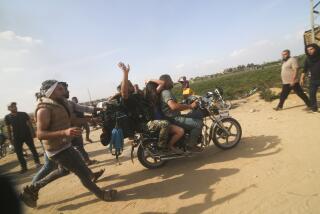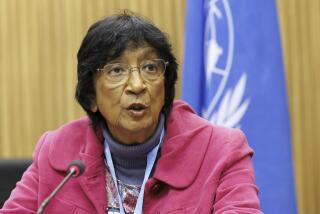New Study Cites Thousands of Bosnia Atrocities
- Share via
WASHINGTON — A new Bush Administration study reports thousands of atrocities in the ethnic conflict over the ruins of Yugoslavia, including allegations that a Serbian internment camp doctor slit the throats of young, healthy prisoners and removed their organs for transplant.
The report, based on accounts of diplomats and other sources considered reliable, also contains charges of torture, rape and wanton destruction of property, generally documenting a conclusion already emerging from anecdotal evidence that the Bosnian civil war is extraordinarily brutal by virtually any standards.
“These are credible reports from a number of sources that report numerous abhorrent acts,” State Department spokesman Richard Boucher said. “A lot of things in there make your blood boil and your stomach turn.”
Although Serbian forces in Bosnia were accused of committing most of the atrocities, complaints also were leveled against Muslim Slavs and Croats.
The report was the second of its kind compiled by the U.S. government at the request of the U.N. Security Council, which has called on all member nations to submit evidence of war crimes from the turmoil in the Balkans. The information will be turned over to the U.N. War Crimes Commission, which in turn will investigate the claims and establish tribunals to bring the perpetrators to trial.
Although the council asked for reports to be submitted before Nov. 6, the United States is the only nation so far to comply. The Administration filed its first report last month.
U.S. officials said that trials cannot occur until the accused have been taken into custody, a difficult process under the circumstances. The U.S. reports included the names of very few of the alleged criminals.
All told, the U.S. government reported several thousand killings, including the cases of 2,000 to 3,000 Muslim men, women and children who were murdered by Serbian irregular forces in the Bosnian town of Brcko in May and June.
In Bosnia-Herzegovina, meanwhile, fighting between Croatian and Muslim factions spread from towns northwest of Sarajevo to the western city of Mostar on Thursday, with Croatian forces apparently making gains.
Despite the battles, nine U.N. relief planes were able to land in the encircled capital after a one-day hiatus because of the fighting.
More to Read
Sign up for Essential California
The most important California stories and recommendations in your inbox every morning.
You may occasionally receive promotional content from the Los Angeles Times.










